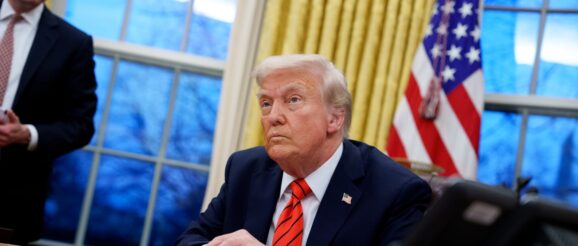Steel tariffs double; Public broadcasting funds

Good morning. You’re reading the Up First newsletter. Subscribe here to get it delivered to your inbox, and listen to the Up First podcast for all the news you need to start your day.
Today’s top stories
Today, President Trump is doubling tariffs on imported steel and aluminum from 25% to 50%. This is the latest move in the president’s trade war, aimed at protecting domestic steel and aluminum workers. However, critics argue that this action will increase costs for businesses and consumers that rely on steel.
- H.O. Woltz, who owns a company in North Carolina that twists steel wire into cables for reinforced concrete, says implementing tariffs won’t eliminate the fact that China is driving the whole world market. Woltz tells ‘s Scott Horsley that he worries tariffs could push the cost of building materials so high that it could put some construction projects on hold. Steel and aluminum are used in many products, from auto parts to cans for soup. They will all be subject to increased taxes. The increases would be passed onto the consumer, which is an unusual strategy for Trump, who campaigned to bring down the cost of groceries, Horsley says.
The Trump administration yesterday formally requested that Congress rescind the $1.1 billion allocated for public broadcasters over the next two years. This reduction in funding for public broadcasting would have a minimal impact on the $36 trillion national debt, yet it represents the entire funding levels for the Corporation for Public Broadcasting through September 2027. Congress had approved this funding in March as part of a stopgap spending bill that the president signed. By law, Trump’s request initiates a 45-day period for Congress to consider it.
- This move is part of Trump’s broader clash with cultural institutions, ‘s Fatma Tanis tells Up First. The president and his allies have accused and PBS of partisan bias. Both organizations are challenging the order in court. CEO Katherine Maher says the administration is punishing public media for coverage it dislikes. In addition to money for public broadcasting, the White House wants to send back money aimed at controlling the spread of diseases like HIV/AIDs, programs related to women’s health and gender issues, and environment and climate change research.
The Gaza Humanitarian Foundation, a private U.S. group running food distribution in Gaza, put its operations on hold today after another deadly shooting near its site yesterday. Twenty-seven Palestinians died in the shooting, according to hospitals and health officials in Gaza. Israeli military officials say warning shots were fired by troops near a few individual suspects, but they didn’t fire at crowds. Airstrikes continued overnight in Gaza as Israel expands its military campaign and continues to restrict aid into the enclave.
- Health officials say dozens of Palestinians have been killed by Israeli gunfire near the sites nearly every day since the operations began a week ago. Organizers said the pause will help them prepare logistically with the Israeli military to deal with the size of the crowds, as they didn’t expect 15,000 people in an hour yesterday. ‘s Hadeel Al-Shalchi says it is apparent that the GHF didn’t know how many Palestinians were willing to walk miles for food due to desperation. Palestinians had been under a total aid blockage for nearly three months.
Deep dive

Justin Sullivan/Getty Images North America
The House version of Trump’s “big, beautiful bill” includes sharp cuts to the tax credits designated to incentivize electric vehicle purchases. Former President Joe Biden promoted policies meant to cut carbon emissions by boosting EV sales, but Trump has long signaled a desire to roll those back. If the Senate embraces EV cuts, new car buyers would be affected as soon as next year. The bill could reshape the future of car availability.
- The consumer tax credit for EVs, worth up to $7,500, would be phased out after 2026. It would become unavailable for most vehicles by the end of this year.
- Lawmakers are considering a new $250 annual fee for EV drivers. It is hypothetically meant to correct the fact that EV drivers don’t pay gas taxes.
- According to a Princeton study, if tax credits are eliminated and federal emissions regulations are reduced, EV sales in 2030 could be 40% lower than they would be under current policies. This change would hinder progress in reducing transportation-related emissions and weaken the ability to compete with Chinese companies in the EV innovation market.
Life advice

girafchik123/Getty Images
- Make a list of values — the things that make your daily life good — and put them in order of importance. When making a decision, go down the list and see which one of your options checks the most boxes on the list.
- Sketch out your ideal life in one year’s, five years’, and 10 years’ time. Then take the options you’re deciding between and see whether you can draw a line from the option to the life you desire.
- Only discuss major decisions with three to five people. Consider your past experiences with each person and whether they provided you with helpful advice.
3 things to know before you go

Evan Agostini/Invision/AP
- Ms. Rachel, the YouTube personality who is popular among toddlers, recently received backlash for speaking out about children living inside Gaza. In an interview with and WBUR’s Here & Now, she says she’s willing to “risk her career” to stand up for them.
- Dollar General, the largest dollar-store chain in the U.S., has seen an increase in sales. This rise is partly due to shoppers opting for less expensive options.
- This week, the White House unveiled a new portrait of the president, replacing the photo taken in January that drew comparisons to a mugshot.
This newsletter was edited by Suzanne Nuyen.
